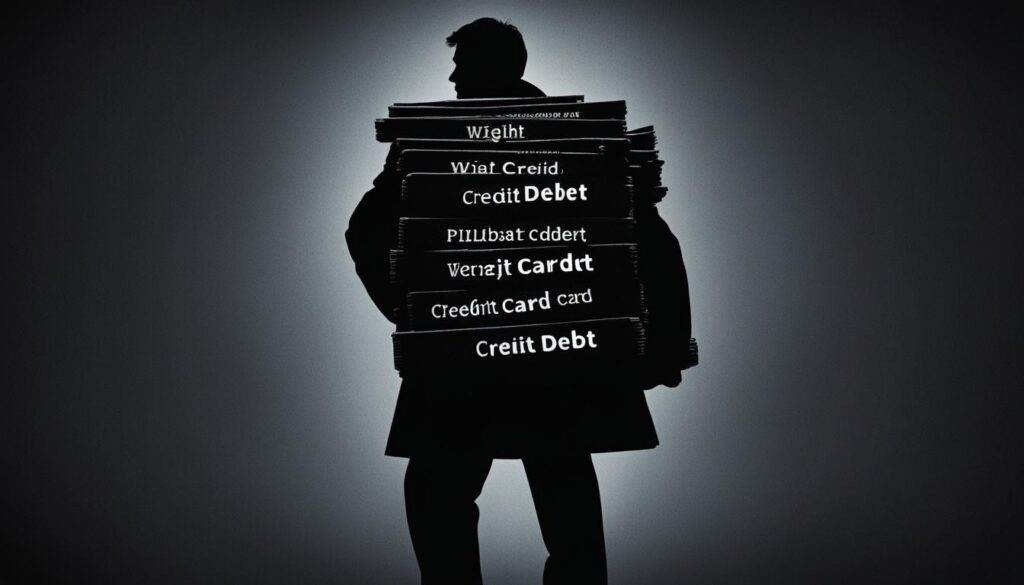Financial freedom is a common aspiration for many individuals. It represents the ability to live life on your own terms, without being bound by financial constraints. Achieving financial freedom requires careful planning, disciplined saving, and strategic decision-making. By setting clear financial goals and implementing effective strategies, you can take control of your financial future and live a liberated life of financial independence.
Key Takeaways:
- Setting specific financial goals is crucial for achieving financial freedom.
- Create a budget to track your income and expenses, and to allocate funds towards your goals.
- Eliminating credit card debt and paying bills on time are essential for financial success.
- Save automatically and start investing early to grow your wealth.
- Monitor your credit score regularly to ensure financial stability.
Set Life Goals
Setting specific life goals is crucial for achieving financial freedom. It involves determining the lifestyle you desire, how much money you need to make that lifestyle possible, and setting a deadline to save that amount. By counting backward from your deadline age to your current age, you can establish financial milestones at regular intervals. Writing down your goals and keeping them visible can help you stay on track.
For example, let’s say you aspire to retire at age 60 with a comfortable nest egg to support your desired lifestyle. You’re currently 35 years old, which gives you 25 years to save and invest for retirement. You can break this down into smaller milestones, such as having a certain amount saved by age 40, 50, and so on. This way, you have clear targets to aim for and can measure your progress along the way.
Visualizing Your Goals
Visual aids can be powerful tools to stay motivated and focused on your financial goals. Consider creating a vision board or using a goal-tracking app to keep your goals in sight. Seeing your goals regularly can help reinforce your commitment to achieving them and inspire you to take the necessary steps to make them a reality.
“Setting goals is the first step in turning the invisible into the visible.” – Tony Robbins
By setting specific life goals, you give yourself a clear direction and purpose for your financial journey. Whether it’s buying your dream home, traveling the world, or starting your own business, having a target to strive for can be a powerful motivator. It also helps you make informed financial decisions that align with your long-term aspirations.
| Financial Goal | Deadline | Lifestyle Requirement |
|---|---|---|
| Save $100,000 for a down payment on a house | 5 years | Owning a home in a safe neighborhood |
| Pay off all credit card debt | 2 years | Financial freedom from high interest rates |
| Retire by age 55 | 20 years | Travel and spend quality time with family |
Having specific financial goals not only helps you make informed decisions about saving and spending but also allows you to prioritize your resources effectively. You can break down your goals into smaller, achievable steps, making your financial journey more manageable and less overwhelming. Remember to review and adjust your goals periodically as circumstances change and new opportunities arise.
Make a Monthly Budget
Creating a monthly budget is a fundamental step in achieving financial freedom. By budgeting, you can effectively manage your finances, meet your financial needs, and reinforce your goals. A budget provides a clear roadmap for your income and expenses, enabling you to allocate your money strategically and track your spending.
When you create a monthly budget, you give every dollar a purpose, ensuring that your money is working for you and supporting your financial goals. It allows you to prioritize your spending, ensuring that essential expenses, such as bills and debt payments, are taken care of. Additionally, budgeting helps you resist the temptation to overspend, as you can actively monitor and control your discretionary spending.
Tracking your spending is an important part of budgeting. By keeping a record of every purchase and expense, you gain insight into your financial habits and identify areas where you can make adjustments. This process enables you to make informed decisions about your spending, identify potential areas of waste, and redirect your money towards your goals.
Reinforcing your goals is another significant benefit of budgeting. When you see your financial goals incorporated into your budget, it serves as a constant reminder of what you are working towards. This reinforcement helps you stay motivated and committed to achieving your goals, even when faced with financial challenges or temptations.
Creating a Monthly Budget
To create a monthly budget, follow these steps:
- List all your sources of income, including wages, freelance work, or investments.
- Identify your fixed expenses, such as rent or mortgage payments, utilities, and insurance.
- Account for variable expenses like groceries, transportation, and entertainment. Consider past spending habits to estimate these amounts accurately.
- Deduct your expenses from your income to determine your discretionary income.
- Allocate your discretionary income towards your financial goals, such as paying off debt, saving for emergencies, or investing.
- Monitor your expenses regularly and make adjustments as needed.
Remember, budgeting is a dynamic process. Adjustments may be necessary as your financial needs and goals change over time. By staying consistent with your budgeting efforts, you have a greater chance of achieving financial freedom and living the life you desire.

Pay off Credit Cards in Full
Paying off credit card debt in full is a crucial step toward achieving financial freedom. Many individuals find themselves burdened with credit card debt due to high-interest loans and outstanding balances. By prioritizing the goal of paying off the full balance on credit cards each month, you can free yourself from the cycle of high-interest debt and take control of your financial future.
High-interest consumer loans, such as credit card debt, can hinder your wealth-building efforts. The interest charges accrued on these loans can quickly add up and make it challenging to make progress towards your financial goals. By paying off your credit card balances in full, you can minimize the interest you pay and redirect those funds towards building your savings or investing.
It’s important to recognize that credit card debt is not the only type of debt that requires attention. While credit cards typically carry higher interest rates, other types of loans, such as student loans and mortgages, may also impact your financial well-being. Taking steps to pay off these loans on time and managing your overall debt load can contribute to your overall financial health and good credit standing.
Benefits of Paying off Credit Card Debt
Paying off credit card debt in full offers several benefits to your overall financial well-being:
- Improved Credit Score: Maintaining a good credit score is essential for accessing favorable interest rates on future loans. By paying off your credit card debt, you demonstrate responsible financial behavior, which can positively impact your credit score.
- Reduced Interest Charges: Credit card interest rates are typically higher than those of other loans. Paying off your balances in full each month can help you avoid costly interest charges and free up funds for other financial goals.
- Financial Freedom: Eliminating credit card debt allows you to have more control over your finances. With fewer monthly debt payments, you can allocate more funds towards savings, investments, or other financial priorities.

By making it a priority to pay off your credit card debt in full each month, you can take significant steps towards achieving financial freedom. It’s important to stay disciplined and committed to your financial goals, as paying off high-interest debt is key to building wealth and securing a strong financial future.
Create Automatic Savings
Creating automatic savings is a crucial step in achieving financial freedom. By setting up an emergency fund and contributing to your retirement plan, you can pave the way for a secure financial future.
Emergency Fund: Preparing for the Unexpected
An emergency fund is a safety net that helps you handle unexpected expenses without derailing your financial goals. It acts as a buffer during challenging times and provides peace of mind. Financial experts typically recommend saving three to six months’ worth of living expenses in your emergency fund.

Retirement Plan: Saving for the Future
Your retirement plan is an essential component of your long-term financial strategy. By contributing to your employer’s retirement plan, such as a 401(k) or an individual retirement account (IRA), you can benefit from tax advantages and ensure a financially secure retirement. Automatic deductions from your paycheck make it easier to stay consistent with your contributions.
Setting Savings Goals: Accomplishing Your Financial Aspirations
When creating automatic savings, it’s important to set clear savings goals. Whether you’re saving for a down payment on a house, a dream vacation, or your children’s education, having specific goals in mind can motivate you to keep saving. Determine how much you need to save and set a timeline to achieve your goals.
The Power of Automatic Contributions
By automating your savings, you remove the possibility of forgetting or being tempted to spend the money elsewhere. Automatic contributions ensure that a portion of your income is allocated toward your savings goals and retirement plan on a regular basis. This consistent approach helps you build wealth over time.
| Benefits of Automatic Savings | Examples |
|---|---|
| Consistency | Contributing the same amount every month |
| Discipline | Automatically saving before spending |
| Accumulation | Watching your savings grow over time |
| Peace of mind | Knowing you’re making progress toward your financial goals |
By taking advantage of automatic savings, you can build your emergency fund, save for the future, and stay on track with your savings goals. Remember, financial freedom is within reach when you prioritize savings and make consistent contributions.
Start Investing Now
Starting to invest early is crucial for achieving financial freedom. While market fluctuations can be intimidating, historically, investing has been one of the best ways to grow wealth. By taking advantage of compound interest and making regular contributions to an online brokerage account, you can set yourself up for significant growth over time.
Benefits of Investing
Investing provides several benefits on the path to financial freedom:
- Compound Interest: Through compound interest, your investments can generate returns that then generate their own returns, allowing your wealth to grow exponentially.
- Long-Term Growth: Despite short-term market volatility, investing in a well-diversified portfolio has historically proven to deliver strong long-term growth.
- Wealth Accumulation: Investing enables you to accumulate wealth, helping you reach your financial goals and achieve a higher standard of living.
- Income Generation: Certain investments, such as dividend-paying stocks or rental properties, can provide regular income streams to supplement your earnings.
Online Brokerage Accounts
When it comes to investing, opening an online brokerage account is a convenient and cost-effective option. With online brokerage accounts, you can:
- Access a Wide Range of Investments: Online brokers offer a variety of investment options, including stocks, bonds, mutual funds, and exchange-traded funds (ETFs).
- Manage Your Investments: You can easily buy, sell, and monitor your investments online, providing you with full control over your portfolio.
- Obtain Research and Tools: Online brokers often provide research reports, educational resources, and investment tools to help you make informed decisions.
- Enjoy Lower Fees: Many online brokerage accounts have lower fees compared to traditional brokers, allowing you to maximize your investment returns.
Regular Contributions
Consistency is key when it comes to investing. Making regular contributions to your investment account, even small amounts, can have a significant impact over time. By setting up automatic contributions, you can take advantage of dollar-cost averaging, buying more shares when prices are low and fewer shares when prices are high.
“The stock market is filled with individuals who know the price of everything, but the value of nothing.” – Philip Fisher
| Regular Contributions Strategy | Impact on Investments |
|---|---|
| Consistent and disciplined savings | Gradually growing investment portfolio |
| Average out market fluctuations | Reduction of investment risk |
| Compounding effect | Accelerated growth of investments |
Remember, investing is a long-term strategy, and it’s important to choose investments that align with your risk tolerance and financial goals. Consider diversifying your portfolio and consulting with a financial advisor to ensure you make informed investment decisions.
Watch Your Credit Score
Your credit score has a significant impact on your financial freedom. It affects the interest rates you’re offered on loans, insurance premiums, and other essential expenses. Monitoring your credit report regularly is essential to ensure the accuracy of your credit score and identify any errors or discrepancies that may be impacting it.
One way to monitor your credit score is by obtaining a copy of your credit report from a reputable credit reporting agency. Reviewing your credit report allows you to check for inaccuracies, such as incorrect account information or fraudulent activity. If you notice any errors, you should promptly report them to the credit reporting agency to have them corrected.
In addition to reviewing your credit report, it’s also worth considering using a reliable credit monitoring service. These services can help you stay informed about any changes in your credit score and provide alerts for potential fraudulent activities. By staying proactive and vigilant in monitoring your credit, you can protect your financial well-being and take necessary steps to maintain or improve your credit score.
Conclusion
Achieving financial freedom is a lifelong journey that requires discipline, careful planning, and continuous learning. By setting specific life goals, creating a budget, paying off credit cards, saving automatically, starting to invest, watching your credit score, negotiating for goods and services, staying informed about financial issues, maintaining your belongings, living below your means, taking care of your health, and considering working with a financial advisor, you can pave the path to a liberated life of financial independence.
Financial freedom is not about a specific number or retirement, but about living a life of meaning and purpose while being in control of your finances. It is about experiencing the joy of being debt-free and having the flexibility to make choices that align with your values and aspirations. By building wealth and harnessing the power of financial independence, you can unlock new opportunities and create a future filled with abundance.
Remember, the journey towards financial freedom is not without challenges. It requires patience, perseverance, and a commitment to making smart financial decisions. Embrace the process of wealth-building and use your newfound knowledge to make informed choices that support your long-term goals. With determination and a clear vision, you can break free from the constraints of financial stress and embark on a fulfilling and liberated life.
FAQ
What is financial freedom?
Financial freedom refers to having enough savings and investments to afford the lifestyle you want without being reliant on a specific annual income. It allows you to have the choice and flexibility to live life on your own terms.
How can I set financial goals for financial freedom?
To set financial goals for financial freedom, it is important to determine the lifestyle you desire, calculate how much money you need to achieve that lifestyle, and set a deadline to save that amount. By breaking down your goals into smaller milestones and regularly tracking your progress, you can stay on track towards financial freedom.
Why is creating a monthly budget important?
Creating a monthly budget allows you to allocate your income towards your financial needs, track your spending, and ensure that all your bills are paid on time. A budget also helps you reinforce your financial goals and resist the temptation to overspend.
How can I pay off credit card debt in full?
Paying off credit card debt in full is crucial for achieving financial freedom. It’s important to make it a priority to pay off the full balance on your credit cards each month. You can also consider consolidating your debt or seeking professional help if necessary.
Why should I create automatic savings?
Creating automatic savings helps you build an emergency fund for unexpected expenses and save for retirement. By having the savings and retirement contributions deducted automatically from your paycheck, you are more likely to stay disciplined and reach your financial goals.
How can I start investing?
Starting to invest early is crucial for achieving financial freedom. It’s advisable to avoid risky stock picking and instead focus on creating a diversified investment portfolio through an online brokerage account. Making regular contributions and taking advantage of compound interest can lead to significant wealth growth over time.
Why is it important to watch my credit score?
Your credit score plays a significant role in your financial freedom. It can affect the interest rates you’re offered on loans, insurance premiums, and other essential expenses. Monitoring your credit report regularly and taking steps to improve your credit score can help you secure better financial opportunities.
What is the key to achieving financial freedom?
Achieving financial freedom requires discipline, careful planning, and continuous learning. By setting specific life goals, creating a budget, paying off credit cards, saving automatically, starting to invest, watching your credit score, and staying informed about financial issues, you can pave the path to a liberated life of financial independence.

